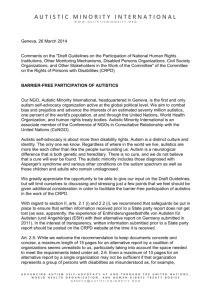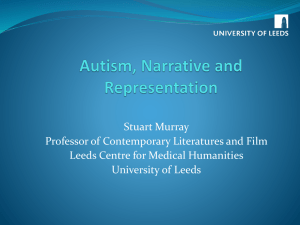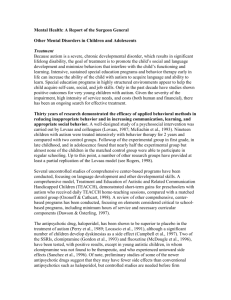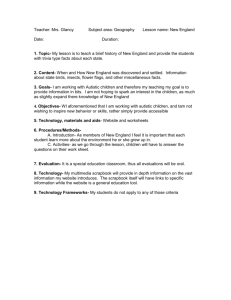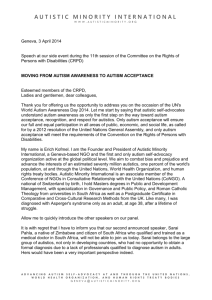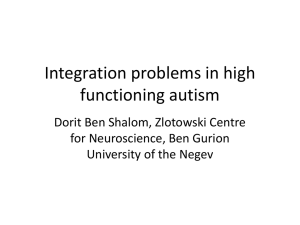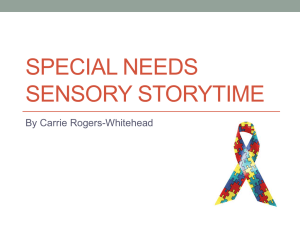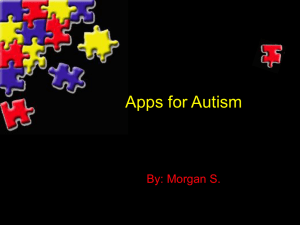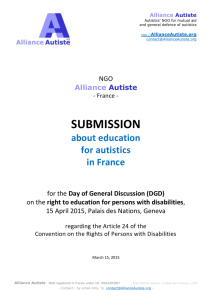Autistic Minority International - Office of the High Commissioner for
advertisement
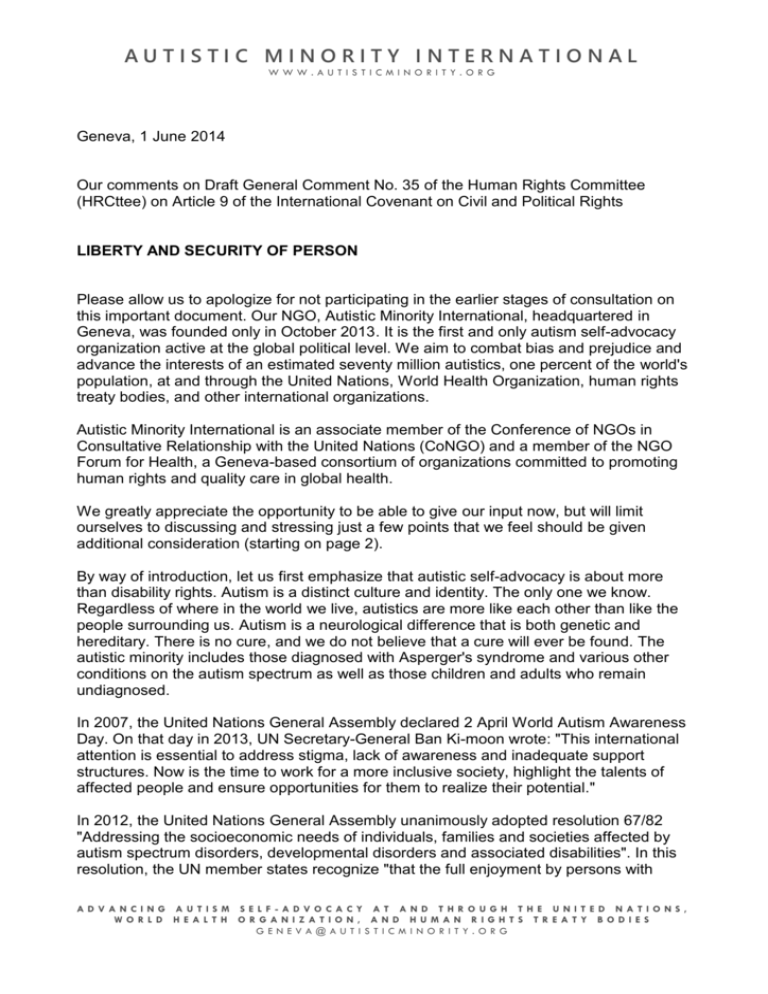
AUTISTIC MINORITY INTERNATIONAL WWW.AUTISTICMINORITY.ORG Geneva, 1 June 2014 Our comments on Draft General Comment No. 35 of the Human Rights Committee (HRCttee) on Article 9 of the International Covenant on Civil and Political Rights LIBERTY AND SECURITY OF PERSON Please allow us to apologize for not participating in the earlier stages of consultation on this important document. Our NGO, Autistic Minority International, headquartered in Geneva, was founded only in October 2013. It is the first and only autism self-advocacy organization active at the global political level. We aim to combat bias and prejudice and advance the interests of an estimated seventy million autistics, one percent of the world's population, at and through the United Nations, World Health Organization, human rights treaty bodies, and other international organizations. Autistic Minority International is an associate member of the Conference of NGOs in Consultative Relationship with the United Nations (CoNGO) and a member of the NGO Forum for Health, a Geneva-based consortium of organizations committed to promoting human rights and quality care in global health. We greatly appreciate the opportunity to be able to give our input now, but will limit ourselves to discussing and stressing just a few points that we feel should be given additional consideration (starting on page 2). By way of introduction, let us first emphasize that autistic self-advocacy is about more than disability rights. Autism is a distinct culture and identity. The only one we know. Regardless of where in the world we live, autistics are more like each other than like the people surrounding us. Autism is a neurological difference that is both genetic and hereditary. There is no cure, and we do not believe that a cure will ever be found. The autistic minority includes those diagnosed with Asperger's syndrome and various other conditions on the autism spectrum as well as those children and adults who remain undiagnosed. In 2007, the United Nations General Assembly declared 2 April World Autism Awareness Day. On that day in 2013, UN Secretary-General Ban Ki-moon wrote: "This international attention is essential to address stigma, lack of awareness and inadequate support structures. Now is the time to work for a more inclusive society, highlight the talents of affected people and ensure opportunities for them to realize their potential." In 2012, the United Nations General Assembly unanimously adopted resolution 67/82 "Addressing the socioeconomic needs of individuals, families and societies affected by autism spectrum disorders, developmental disorders and associated disabilities". In this resolution, the UN member states recognize "that the full enjoyment by persons with ADVANCING AUTISM SELF-ADVOCACY AT AND THROUGH THE UNITED NATIONS, WORLD HEALTH ORGANIZATION, AND HUMAN RIGHTS TREATY BODIES GENEVA@AUTISTICMINORITY.ORG AUTISTIC MINORITY INTERNATIONAL W W W . A U T I S T I C M I N O R I T Y . O R G autism spectrum disorders [...] of their human rights and their full participation will result in significant advances in the social and economic development of societies and communities" and stress "the important contribution that non-governmental organizations and other civil society actors can make in promoting human rights for [...] all individuals with autism spectrum disorders [...] and their integration in societies". The GA voices its concern "that persons with autism spectrum disorders [...] continue to face barriers in their participation as equal members of society" and calls this "discrimination" and "a violation of the inherent dignity and worth of the human person". As individuals and as a group, autistics continue to be denied the "four key pillars of minority rights", as identified by the UN's Special Rapporteur on Minority Issues, Ms Rita Izsák: "protection of existence and prevention of violence against minorities; promotion and protection of minority identity; equality and non-discrimination; and the right to effective participation in all areas of public, economic and social life". Our very existence is in danger as long as autism, without regard to severity, continues to be viewed as something to be eradicated. Violence against us takes the form of behaviour modification, institutionalization, and abusive medical and therapeutic practices, such as electric shocks or "packing" (see our joint submission with Alliance Autiste of 25 April 2014 for the List of Issues on France). Instead, we should be taught self-esteem, self-confidence, and how to advocate for ourselves. The autistic minority also includes those of us who hide their condition for fear of discrimination. This is no longer tenable at a time when millions of children diagnosed with autism come of age and many more get diagnosed as adults. Autism awareness must lead to acceptance, recognition, and respect for autistics. Only autism acceptance will ensure our full and equal participation in all areas of public, economic, and social life. With regard to liberty and security of person, we fully support the urgent request by the UN's Special Rapporteur on Disability, Shuaib Chalklen, submitted on 27 May 2014, to bring Draft General Comment No. 35 in line with the provisions of the Convention on the Rights of Persons with Disabilities (CRPD). To date, the CRPD has been ratified by 147 States parties and signed by 11 more countries. We strongly urge the HRCttee not to release a General Comment that falls behind the standards established by the CRPD and confirmed by three quarters of the world's nations. This would not only be counterproductive and detrimental to human rights, but also jeopardize the advances made by persons with disabilities, including autistics, over the past decade. Most of the States parties to the CRPD are also States parties to the International Covenant on Civil and Political Rights (ICCPR). They themselves recognized that time has moved on and Article 9 of the ICCPR must be reinterpreted in light of – and enlightened by – the provisions of more recent human rights treaties when it comes to mental health detention and the institutionalization of persons with perceived disabilities such as autism. States parties themselves committed to following stricter rules than those called for by the jurisprudence of the HRCttee. What justification can there be for the HRCttee to lag behind the international consensus, rather than assume leadership once more? If this means revisiting and reversing its jurisprudence over the past thirty years, we can assure the HRCttee of the vocal support and sympathy of the disability rights community and its many allies. 2 AUTISTIC MINORITY INTERNATIONAL W W W . A U T I S T I C M I N O R I T Y . O R G The most important principles of the CRPD as they apply to Article 9 of the ICCPR are consummately outlined in the comments submitted by the UN's Special Rapporteur on Disability and organizations such as the World Network of Users and Survivors of Psychiatry (WNUSP) as well as a joint letter opposing the Draft General Comment's paragraph 19, signed by a large number of civil society and disabled persons' organizations and individual experts from all over the world, including WNUSP, the International Disability Alliance (IDA), Autistic Minority International, and various national autism self-advocacy groups. We refer you to these documents, available on the HRCttee's website. Thanks for your attention. In continuing its work on the Draft General Comment, we encourage the HRCttee to seek the dialogue and coordinate its recommendations with the Committee on the Rights of Persons with Disabilities, mandated to monitor the implementation of the CRPD, so as to ensure the application of universal standards of protection across existing international human rights instruments. We welcome the recognition, in paragraph 8 of the Draft General Comment, that "States parties have the duty to protect the right to liberty of person against deprivations by third parties. States parties must take appropriate measures for the purpose of protecting individuals against [...] wrongful deprivation of liberty by lawful organizations, such as [...] hospitals." In accordance with the CRPD, any case of disability-related institutionalization without a person's free and informed consent must be viewed as wrongful. We concur with paragraph 12 that such "detention may be authorized by domestic law and nonetheless be arbitrary. The notion of 'arbitrariness' is not to be equated with 'against the law', but must be interpreted more broadly to include elements of inappropriateness, injustice, lack of predictability, [...] as well as elements of reasonableness, necessity, and proportionality." The involuntary detention of autistic persons, justified on mental health grounds or similar, cannot but fail to live up to these heightened standards. More often than not such institutionalization lacks predictability and necessity, is disproportionate, inappropriate, and unjust, and plain unreasonable. We hold that the safeguard of paragraph 18 whereby "[c]hildren may be deprived of liberty only as a measure of last resort and for the shortest appropriate period of time, taking into account their best interests as a primary consideration with regard to the duration and conditions of detention", must equally apply to children with disabilities, including autistic children and adolescents. While we do not condone the institutionalization of any person against their will, there can be even less justification for the prolonged and often indefinite institutionalization of children simply because they are autistic or otherwise disabled. The wishes and interests of parents or guardians who may perceive such children as burdens must not be confused and equated with the best interests of the child. It is never in the best interest of the child to be deprived of liberty. Strike or amend paragraph 19. While indeed "States parties should revise outdated laws and practices in the field of mental health in order to avoid arbitrary detention", the requirement to do so derives from the CRPD rather than the ICCPR. The ICCPR does not mention mental health at all, and any jurisprudence on the subject by the HRCttee is entirely self-referential. At this point, the outdated jurisprudence of the HRCttee with its anachronistic recommendations hinders implementation of the farreaching CRPD provisions rather than advancing any substantial human rights. If the HRCttee does not 3 AUTISTIC MINORITY INTERNATIONAL W W W . A U T I S T I C M I N O R I T Y . O R G see fit to align its jurisprudence with the CRPD, it would be preferable the HRCttee kept quiet on the subject of mental health detention going forward. Paragraph 3 of the Draft General Comment specifies that Article 9 guarantees the rights to liberty and security of person to "everyone", including "persons with disabilities". This is elaborated on only twice, in paragraphs 28 and 30, which refer to "vulnerable persons" – paragraph 28 mentioning specifically "certain persons with mental disabilities" – in the context of providing reasons for arrest and notice of charges in criminal proceedings to "family members, guardians, or legal representatives". We miss any reference to steps States parties should take to ensure that, for example, autistics are not disadvantaged in interactions with police and court proceedings due to their deviating body language, aversion of eye contact, lack of speech, and so on, all of which can easily give rise to misunderstandings when judged by non-autistic standards, and that they are not treated unfairly or more harshly by police officers and court officials because of prevailing prejudice. Paragraph 58 states that "[p]rompt and regular access should be given to independent medical personnel and lawyers and [...] family members. Detainees should be promptly informed of their rights, in a language they understand. Independent and impartial mechanisms should be established for visiting and inspecting all places of detention, including mental health institutions." We ask that these recommendations be expanded to include peer support systems, such as those provided by autistic self-advocacy groups. Autistic individuals or representatives of autism self-advocacy organizations should be included in the relevant mechanisms visiting and inspecting mental health facilities and autism self-advocacy organizations be granted access to autistics that are institutionalized, so that their situation may be investigated, autistics can be educated about their rights, and organizations may act on behalf of those deprived of their liberty. Though not mentioned in the Draft General Comment, part of security of person is also that autistic children, adolescents, and adults are consulted on any and all forms of medical and psychological treatment and therapy, particularly while institutionalized against their will, and that they are not sedated, treated, or therapized without their free and informed consent. While it seems customary to deprive institutionalized persons with disabilities, including autistics, of access to information and communication, this is particularly devastating to those of us who do not speak and rely on the Internet as their sole means of communication. The importance of unrestricted access to online communication for autistics cannot be emphasized strongly enough. Being cut off from the Internet also means being cut off from the autistic community and any available peer support. Finally, steps must be taken by States parties to prevent the sexual abuse of autistics and other persons with disabilities institutionalized against their will. Thank you for your consideration. Erich Kofmel, President Autistic Minority International 4
